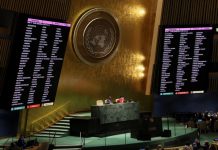United States Secretary of State Antony Blinken has arrived in Egypt on the second day of his tour of Middle East to bolster a ceasefire reached last week between Israel and Hamas, the Palestinian faction that runs the besieged Gaza Strip.
Eleven days of Israeli bombardment that began on May 10 killed at least 248 Palestinians, including 66 children, and wounded nearly 2,000 in the coastal enclave. Only 12 people in Israel, including two children, were killed by rockets fired by Hamas and other armed groups from Gaza during the same period.
Blinken’s visit to Cairo on Wednesday came a day after he held separate meetings with Israeli Prime Minister Benjamin Netanyahu and Palestinian Authority (PA) President Mahmoud Abbas.
He pledged millions in aid to rebuilding efforts in Gaza that he said the US would “ensure” would not benefit Hamas, with whom Washington does not have direct contact and labels a “terrorist organisation”.
In Cairo, Blinken was due to meet Egyptian President Abdel Fattah el-Sisi before flying on to Jordan for talks with King Abdullah II.
Egyptian mediators have been leading negotiations between Israel and Hamas.
US President Joe Biden, in a call with el-Sisi on Monday, thanked Egypt for “its successful diplomacy” and coordination with Washington to achieve the ceasefire.
The Biden administration has credited its own “quiet”, behind-the-scenes approach with bringing an end to the bombings, brushing off criticism that the US did not take a hard enough line with Israel in the early days of the escalation, which included the US blocking four times a United Nations Security Council joint statement calling for a ceasefire.
Following his meetings with Netanyahu and Abbas on Tuesday, Blinken called on all parties “to build on the ceasefire and try to move things in a genuinely positive direction”.
He said the Biden administration “would notify Congress of our intention to provide $75m in additional development and economic assistance to the Palestinians in 2021”. He also pledged $5.5m in “immediate disaster assistance” for Gaza and about $32m for the United Nations agency for Palestinian refugees.
Blinken said the US will work with partners to “ensure that Hamas does not benefit from the reconstruction assistance”, but did not offer details on how that would be achieved, or how the ongoing discord between Hamas and the Fatah-led PA would be navigated.
While referencing that a future Israel-Palestine peace process “ultimately requires two states”, and condemning actions that lead to further violence, including annexation, home demolitions and settlement activities, Blinken has put relatively little emphasis on wider peace negotiations during his trip.
Instead, he said the US would support economic development and the creation of opportunities in the occupied Palestinian territory and called for “equality” for Palestinians.
Blinken also announced the plans to reopen its Consulate General in occupied East Jerusalem, which had overseen relations with the PA before former President Donald Trump relocated the US embassy to Jerusalem in 2018 – a move denounced by Palestinians and rights groups.
The Biden administration has said it will keep the embassy in Jerusalem.
Blinken also announced on Tuesday that Washington would replenish Israel’s Iron Dome air defense system, as the administration has repeatedly indicated it does not plan to heed the calls of some US legislators to curtail arms sales and unconditioned military aid to Israel in the wake of the violence.









